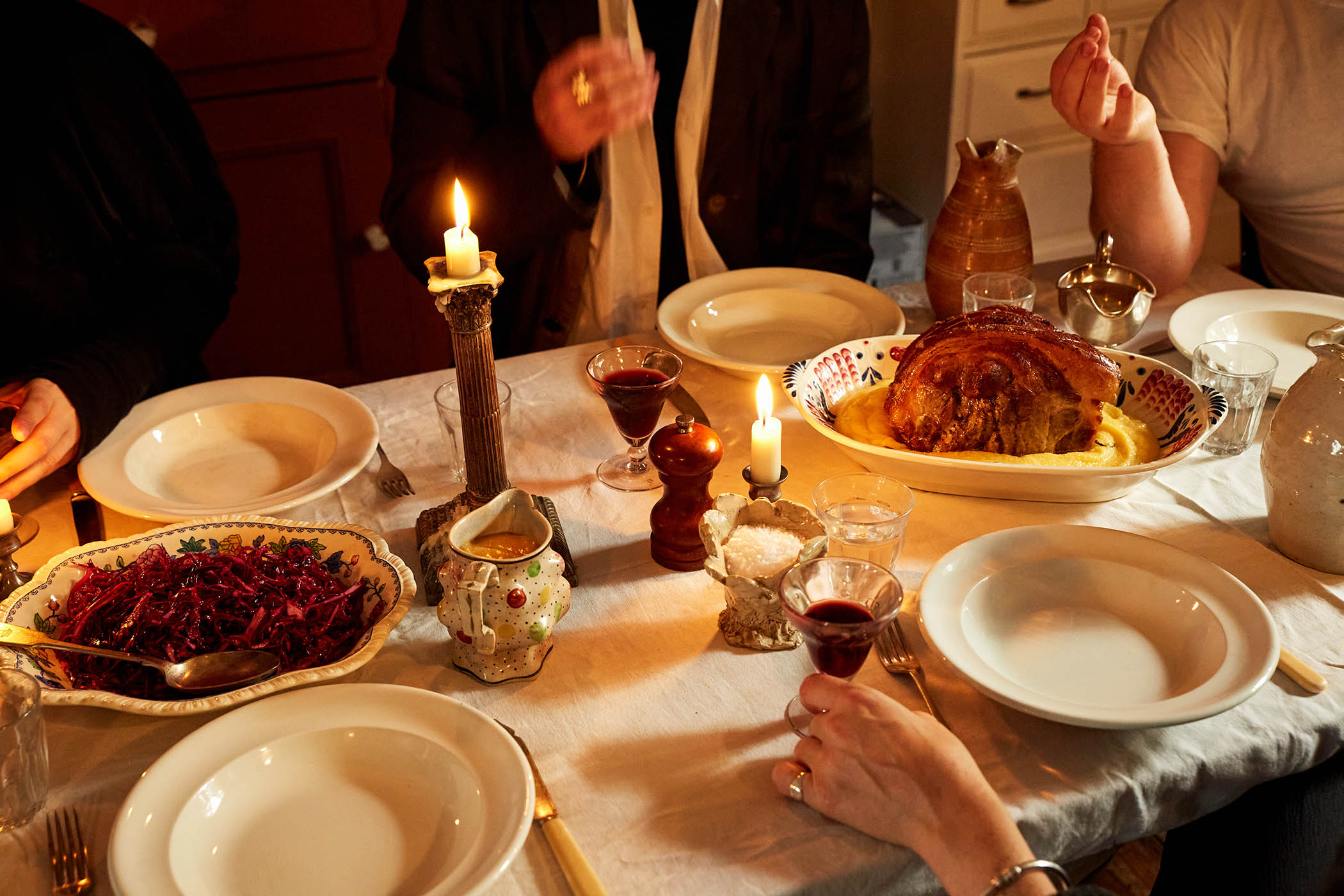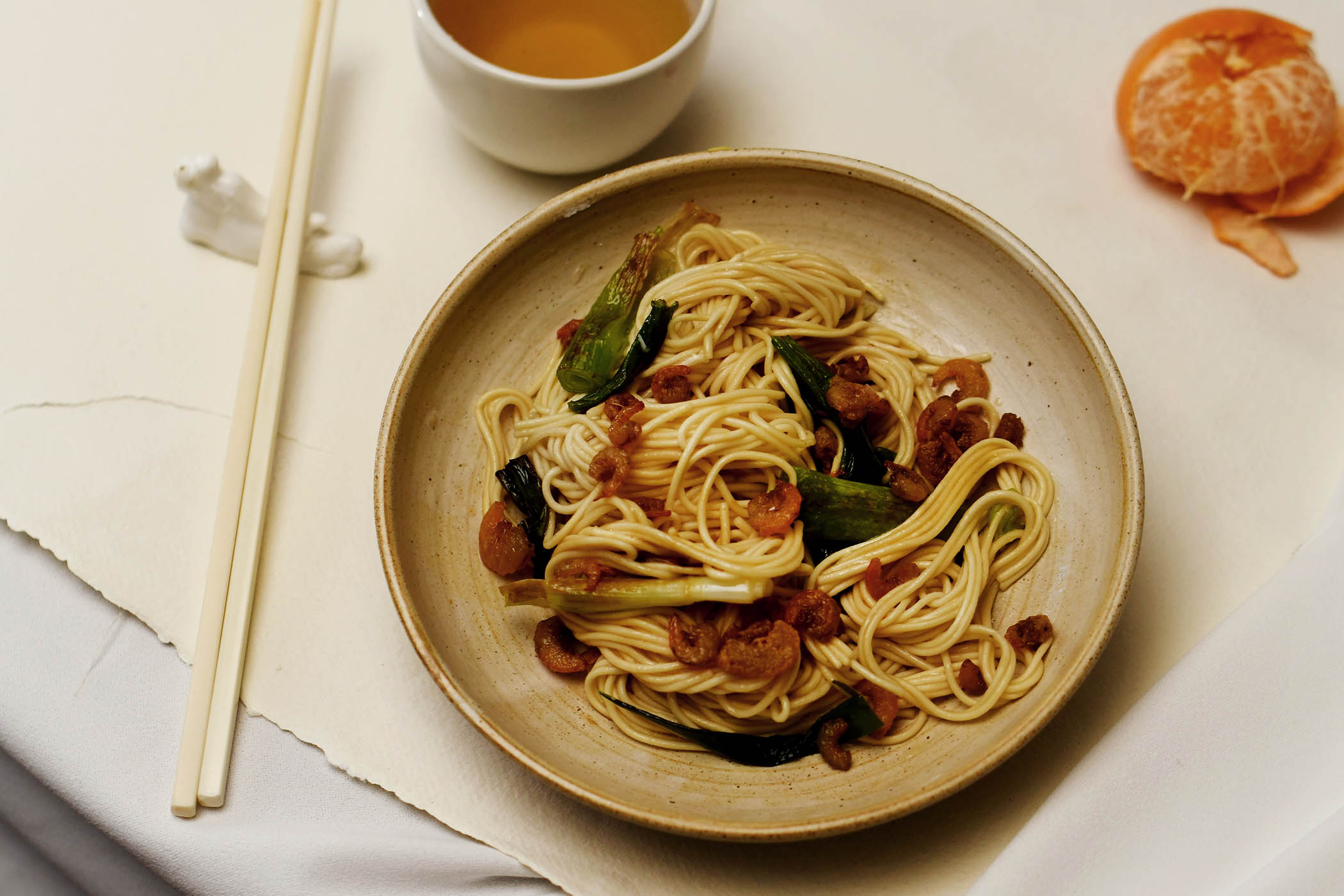I spent most of my childhood in rural south Devon, where the turn from autumn to winter was brisk. The air would thin suddenly, the trees would shed, the birds would quieten, the scent of woodsmoke would fill the evening air. Fires were important for warmth, but also against the looming dark, which sat comfortable as a toad.
And so life would take place in the cramp of the kitchen, centred around soups and stews, curries and roasts. On autumn weekends, the kitchen would be damp and sweet-smelling. My father would stew blackberries from the hedgerows, crab apples and quinces from our trees, specially ordered oranges from Spain to make jams, marmalades and jellies.
In London – in any town or city – the season’s turn feels slower, rarely announced by nature, the quickening darkness of the night kept at bay by streetlights. And so when it becomes really cold, really bleak, it can catch me by surprise.
Still, I sometimes find myself wishing for the colder months on long summer evenings, because autumn is when our northern islands become themselves. For a hosting cook, this is the most exciting season: it is when the harvest shines brightest. I visit a farm stall every Sunday and see the season change there: the cabbages in their grandeur, the squash’s eccentricity, the solid quality of apples and pears – all of it exciting. Summer’s bounty wants to be messed with as little as possible: a good tomato served sliced with oil; green beans blanched for only a few seconds. But cold-weather vegetables yearn to be cooked. There is nothing better than good butter on toast beside soup, nothing so fitting for a freezing Sunday than a roast, pie or rich curry.
This bounty and the cruelty of the weather calls for sociability and feasting. Since my partner, Lowena, and I moved into our first tiny, freezing, flat when we were 18, we’ve been gathering friends around our table for simple meals. But though the cold months require sociability, they shun it, too. Which of us, cold and tired, thinks to go across town to someone else’s house? Who doesn’t feel time-cramped by work? And so the host has more responsibility still to invite people, to gather them, as an antidote to loneliness.
People balk at the idea of hosting, but it needn’t be stressful. An inexperienced host should cook whatever they’re most comfortable with, even if that’s macaroni and cheese or fried eggs, with a bar of chocolate for dessert, wine drunk from coffee cups. Hosting need cost very little, really, and yet it pays dividends.
None of this advice is particularly novel. My grandparents would have had the same thoughts on what to serve, what level of candlelight, whether to offer hot or cold drinks. Only our atomisation is new, the increased loneliness of the current moment, and the speed of our lives. Against such speed it is good to be reminded that we share food as a way of warding off the ills of the world, our collapsing services and indifferent government, international wars, hunger. And that when we depart from friends we do so re-energised, able to take on our own troubles, and the world’s, too.
Entertaining over Sunday lunch
Sunday lunch is a concept rather than a time. It holds the prospect of unhurried feasting and familial comfort. I only invite the people I really like, and the concept may take hold as readily on a Saturday afternoon as a Sunday evening. The best Sunday lunches take place after a walk – in the country, across the city, it doesn’t matter where – during which the weather’s meanness makes you and your guests look forward to the table’s warmth. Inside visitors should be encouraged to relax, lounge around chatting while the cooking finishes. Gin and tonic or beer or cold soda are best served before lunch, with little snacks to stimulate the appetite. The best meal is, obviously, a roast. Nothing new here. A haunch of meat or a chicken, potatoes, carrots and cabbage, plenty of gravy, or something grand and luxurious like a whole stuffed pumpkin. Or perhaps something your grandmother would cook, or a favourite uncle – something large in memory. Pudding should be decadent and old fashioned: crumble with custard, a trifle, an apple pie. Starters are unnecessary work – the wrong kind of gluttony, stopping people from taking second helpings.
Entertaining on a week night
Start earlier than you would in warmer months so your guests don’t have to struggle home in the dreary late-night cold. Have something simple on the table for their arrival – crisps, pickles – along with wine or beer and something without alcohol, like a switchel or cordial. If anyone looks especially cold, offer them a jumper. Lay coats and jumpers on your bed and, if it’s raining and you have any particularly wet guests, offer them a shower and a change of clothes. Since all but the most desperate will refuse, you’ll know they really need it.
I like to have a big pan of something for a cold-weather dinner party, something central – pork shoulder, a lasagne, a grand pie – that functions as a focal point for the evening, illuminated by the flickering of candles. Week-night dinners don’t tend to last long, and guests mostly don’t want to drink to excess, so serve food promptly, and make sure there’s water on the table. Afterwards, serve coffee or tea and a simple cake with custard. Your guests will leave thoroughly warmed and you will sleep well.
Entertaining for large groups
The most important thing to remember is that, even in the deepest winter, rooms full of people get very hot. By all means serve mulled wine or cider, the latter especially is very economical, but make sure you have cold things to drink in the fridge and plenty of ice. Or better yet, tell your guests what to bring. When feeding more than eight, it’s unnecessary to make anything more complicated than a pasta or a stew, certainly something that can be eaten standing up if needs be, fork in one hand, plate in the other. What could be more fun than a great pot of spaghetti pomodoro beside a hunk of parmesan, making your table rustic and inviting, a painting of a rich peasant’s dinner. Open the windows if they start to steam up and make sure as many surfaces as possible are clear, ready to hold plates and glasses. Have candles around the room, and the lights dim, and bathe, hopefully, in laughter.
Entertaining by yourself
Never is the loneliness of winter felt as deeply as when you’re alone, returning to an empty home, the world outside horrid and the world inside silent. And so it is especially important to take care of yourself. When I’m alone on a winter’s evening I like to impose a certain formality, laying the table and lighting candles, myself the guest. Music is important, a book held open with something heavy, or a laptop opposite.
For such lonely jollity I like simple and quick meals: an omelette with vegetable salad, puttanesca, grilled fish, a dal or soup. I’d rarely make soup for myself alone, but when I do I’ll make lots, keeping the rest in the fridge to be reheated. (Not quite the humiliation of meal prepping, but certainly the ease.) And if cooking is too much to bear, I’ll eat toast and cheese with a couple of apples and pears, some ham, paté, using a short sharp knife to cut everything up. The point here is not really the food itself but the environment, which is designed to lift the spirits. And since this is something I rarely convince myself to do, I know the difference it can make.
Entertaining a lover
Cuffing season is what the kids call autumn and winter, for they have noticed that love often blooms as an antidote to the cold. Cooking for a lover is very intimate, more so if they’re with you as you cook. If this is the case give them something simple to chop or peel, but most importantly make sure they’re warm, sitting facing you with a toddy. I think there’s something very romantic about a hot toddy before dinner, since it is simultaneously expressive of care and jollity. For those who don’t drink, three teaspoons of cider vinegar replace the whiskey’s edge.
Don’t worry if your kitchen’s cold since blankets upon knees can join the drink offering warmth. Of course, the most romantic meal is a roast chicken with bread, butter and a simple green, eaten with abandon, though I might also opt for something more warming, a ratatouille perhaps, but.
I would generally stay away from soups, since they speak of humble frugality, not excitement and seduction. You want comfort, yes, but nothing too wholesome.
A candle on the table is lovely, but don’t go overboard and do something you wouldn’t otherwise, since ease is more attractive than showiness. Avoid oysters for this is presumptuous, but make a dessert that can be easily reheated to be eaten later in bed.
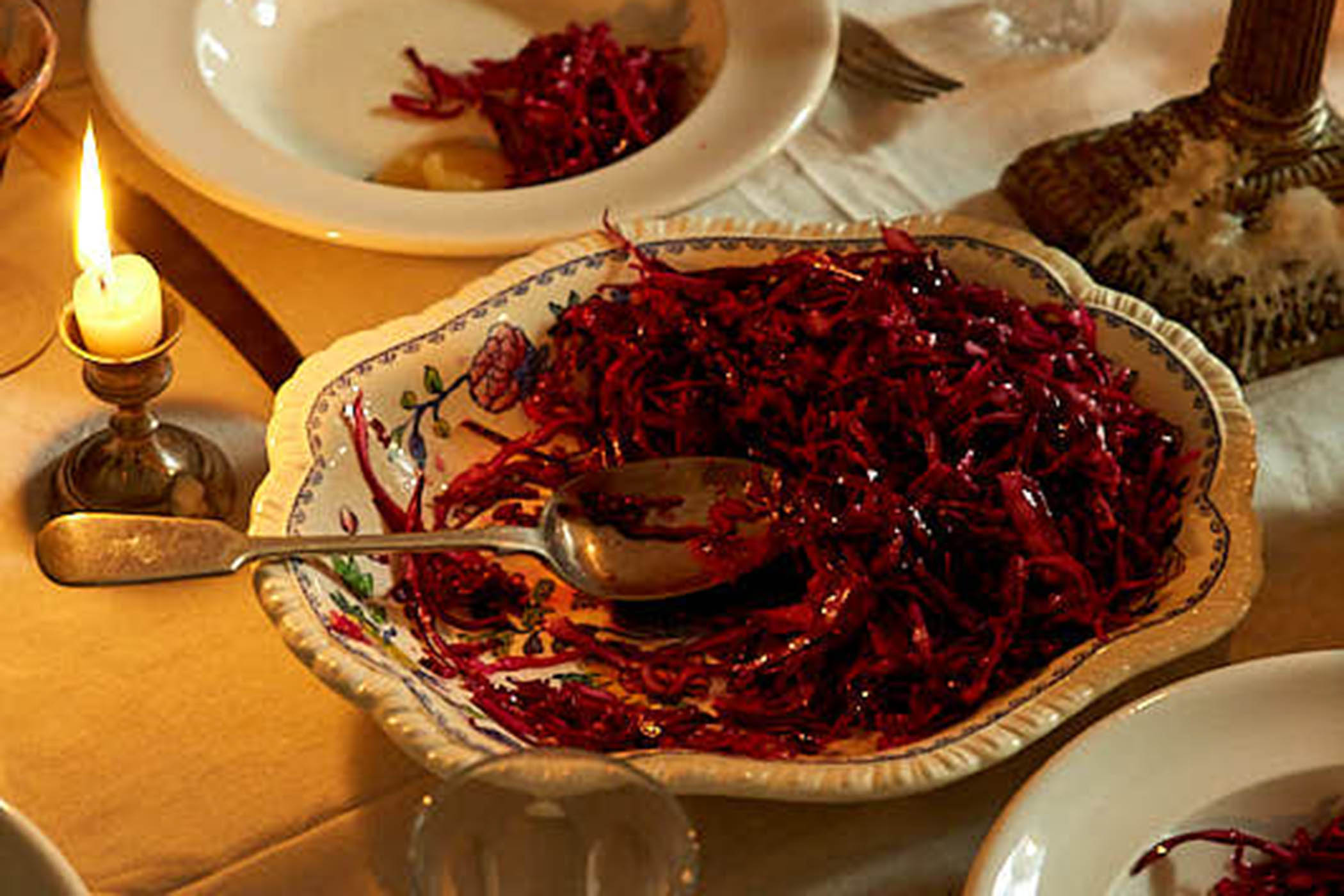
Salad Baronne
Serves 6. Ready in 30 minutes, plus an extra hour to sit.
red cabbage ½
wholegrain mustard 1 tbsp
fine salt 1 tsp
white or cider vinegar 150ml
oil a drizzle
Quarter the cabbage and use a mandolin to cut it into thin slices into a large bowl.
Mix in the rest of the ingredients together with your hands, scrunching the cabbage hard, and leave to rest for up to an hour before serving.
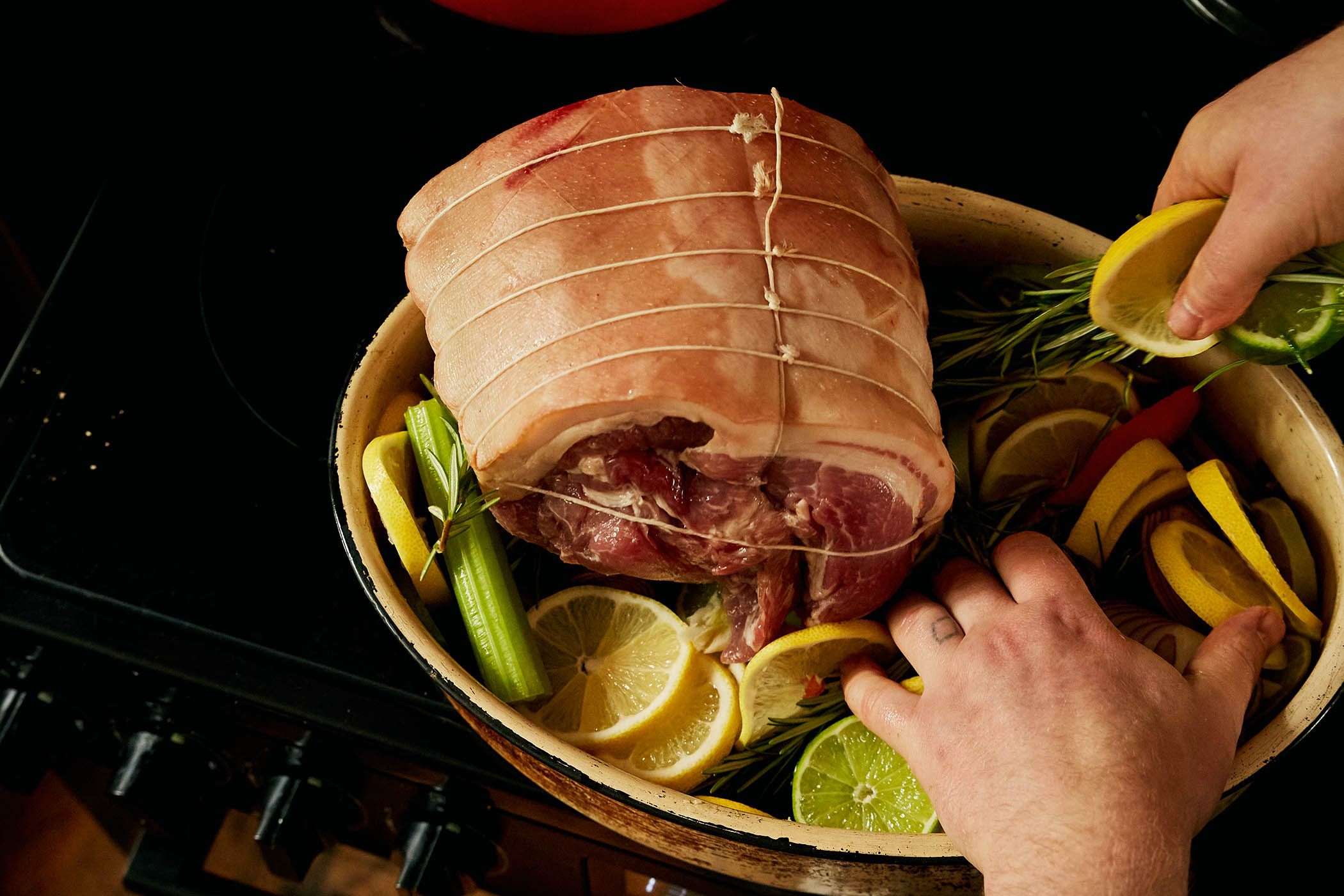
Pork shoulder
Serves 6. Ready in 7 hours (30 minutes prep and the rest is cooking time).
rolled pork shoulder 2kg
red onions 3, halved
carrots 2, cut lengthways
celery sticks 2, halved
rosemary sprigs 6
limes 3, thinly sliced
lemons 2, thinly sliced
garlic 2 large cloves, crushed
salt a generous pinch
white wine 1 cheap bottle
Place all the chopped vegetables into an oven pan, pour over the wine and 1 litre of cold water, then place the meat on top of the vegetables in the pan.
Cook at 180C/gas mark 4 for 1 hour, then take the pan from oven and use tongs to pick out and remove the lemon and lime slices.
Return to the oven at 120C/gas mark 6 and cook, covered in tin foil, for 6 or more hours. If it makes it easier, the pork shoulder can cook in the oven overnight, though for this I would turn the temperature down to 100C/gas mark 1 .
For the last half hour of cooking, return the oven to 180C/gas mark 4 and uncover the pork, so that the crackling can form.
While the pork is resting, reduce the sauce and salt to taste. Serve the meat atop polenta with the sauce in a gravy jug.
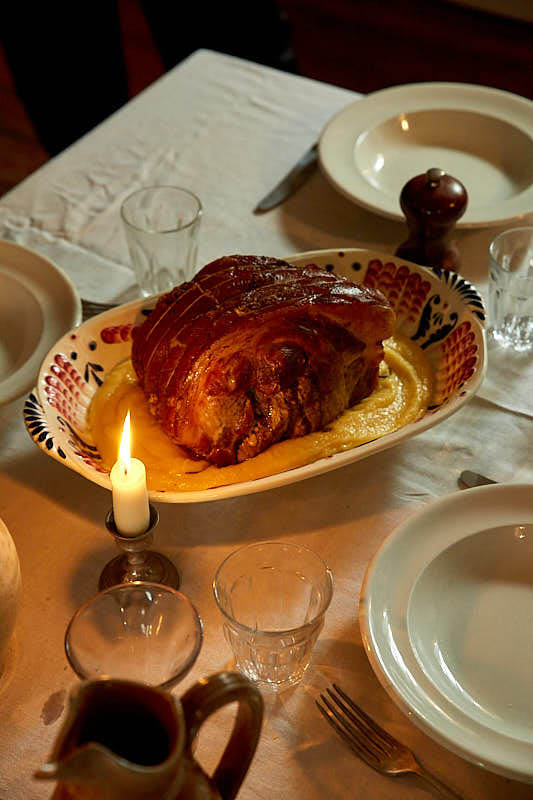
Roast apple sauce
Serves 6. Ready in 80 minutes.
cooking apples 6
olive oil
white onion ½
red chilli ½, fresh
limes 2, juiced
salt generous pinch
Quarter and core the apples, then place them in a roasting tin and cook at 120C/gas mark 6 for half an hour – the same oven as the pork.
Remove from the oven and allow to cool, then scoop the flesh from the skins and blend with the onion, chilli, lime juice and salt. Test for seasoning and serve beside the pork in a jug or bowl.
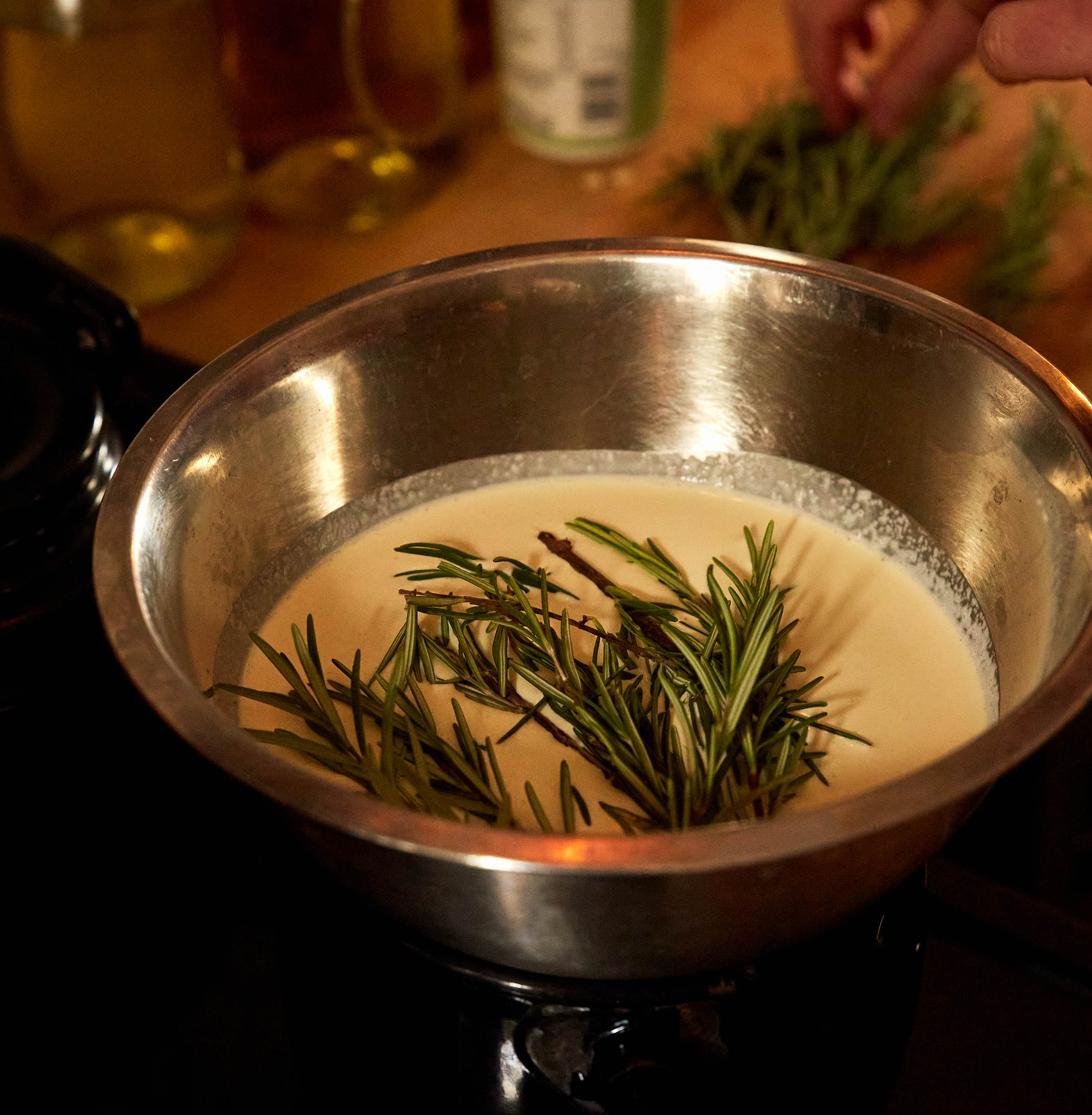
Rosemary custard
Serves 6. Ready in 3 hours.
double cream 600ml
rosemary 4 sprigs
egg yolks 2
whole eggs 2
white sugar 50g
Infuse the cream with rosemary by heating it gently in a metal bowl above a pan with hot water, a homemade bain-marie, stirring every now and then for an hour. Remove and strain through a sieve into another bowl, using the back of a spoon to push the rosemary into the mesh, so you squeeze out as much cream and rosemary essence as possible.
Beat together the eggs and sugar in the bowl you used for infusing, again placing it on your homemade bain-marie and making sure the water does not touch the bowl, then slowly add the still warm rosemary cream, whisking as you go.
Another pair of hands is useful for this.Leave for an hour or so, giving it a beating every 20 minutes – it will begin sticking to the bottom first, this is fine, and will be consistently thick by the end. Leave overnight in the fridge if you want cold, set custard.
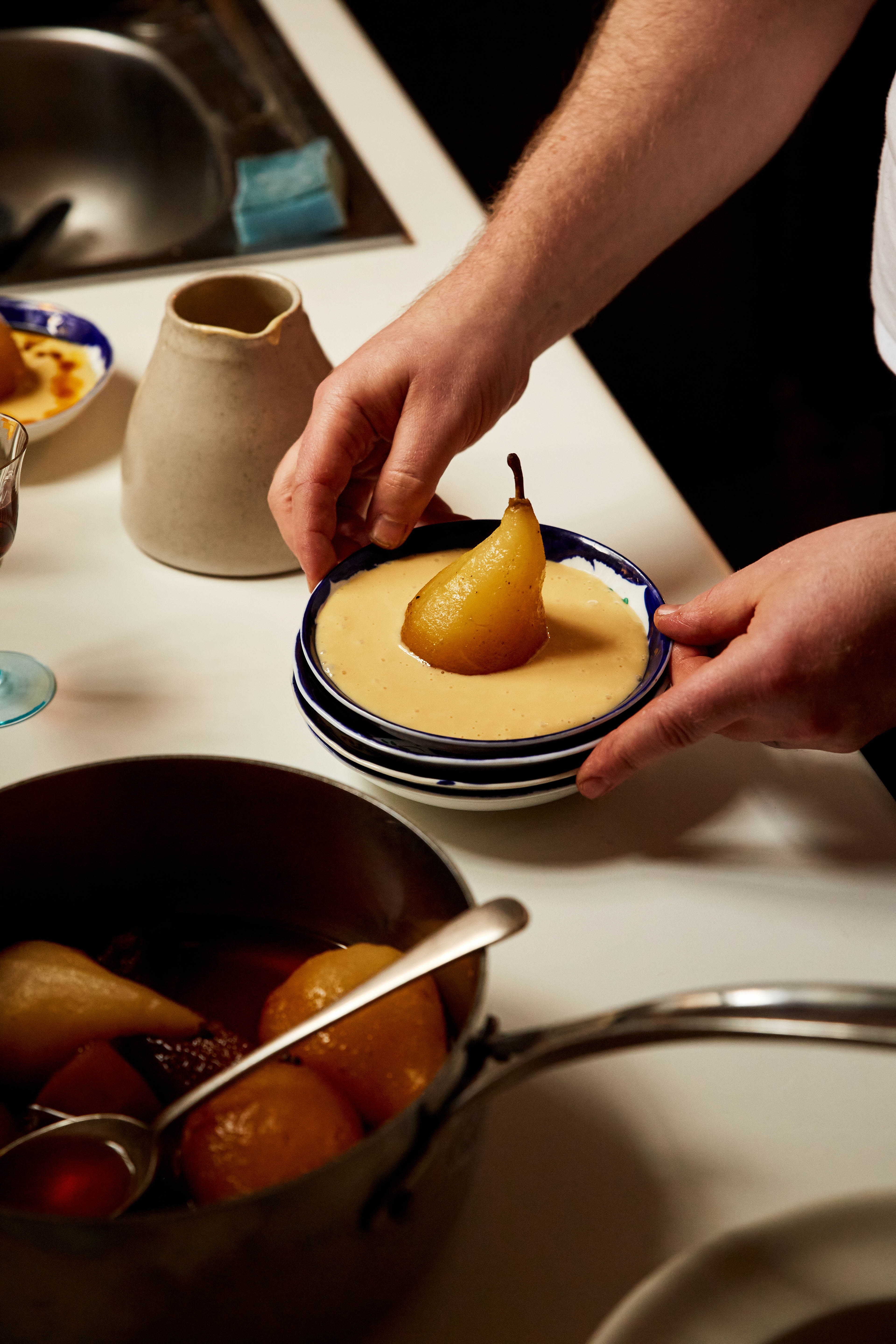
Sherry poached pears
Serves 6. Ready in 80 minutes.
lemon ½
orange ½
saffron large pinch
sweet sherry 260ml
water 110ml
cloves 4
star anise 1
green cardamom pods 5
nutmeg generous grating
pears 6, hard, peeled
Add everything to a pan with a lid, standing the pears up, bring to the boil and then leave on a low heat, lid on, for an hour. This is one of the few recipes where I side with the idea of cooking with an alcohol that’s good enough to drink, for the sherry really comes through in the syrup, which is excellent poured over the pear, especially with rosemary custard, too.
After an hour, check the pears are soft but retain a bite, and serve with custard. Unripe pears may need a little less time, and it is best not to use fruit that’s very ripe since it can be mushy.
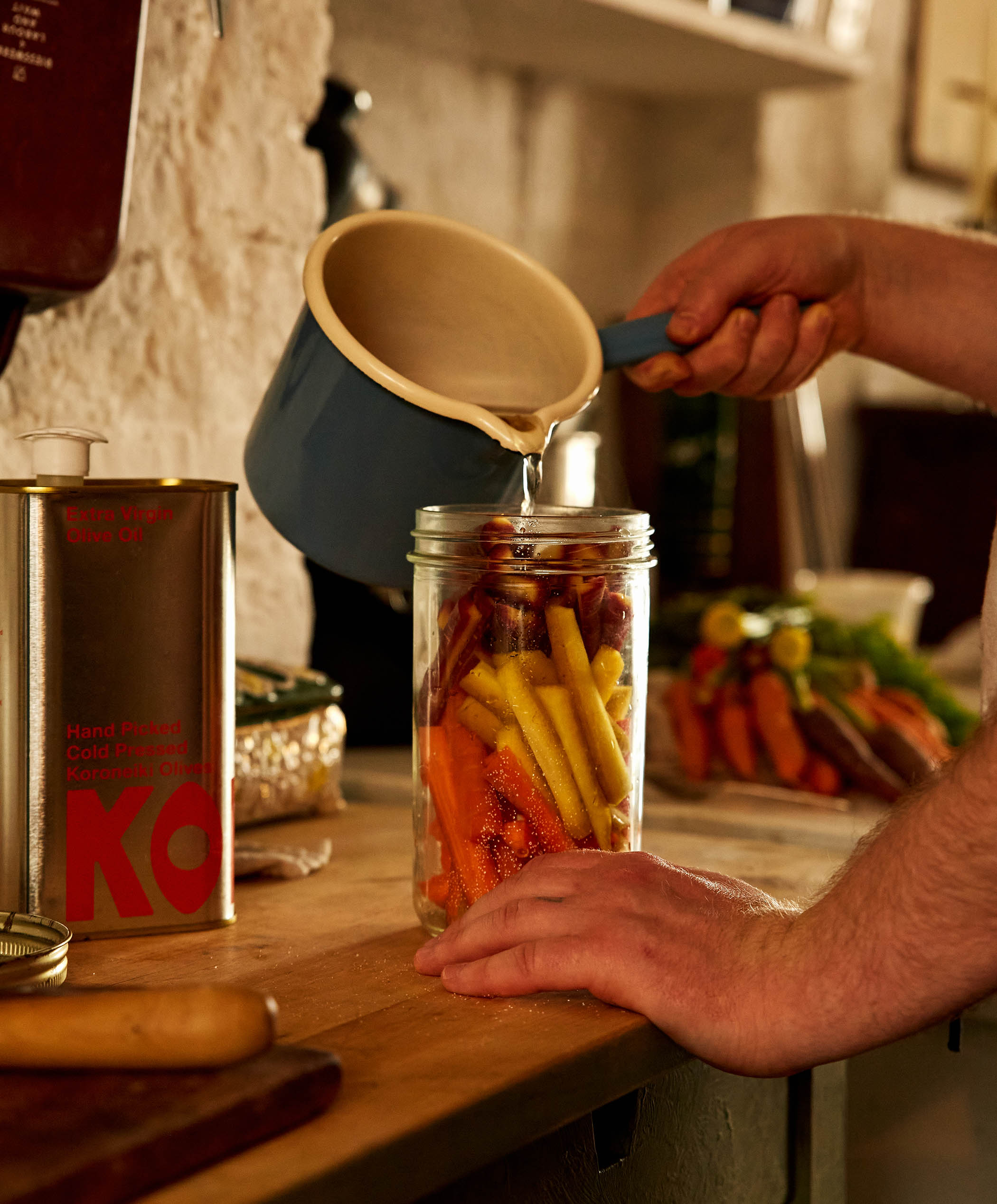
Quick pickled carrots
Serves 6. Ready in 3 hours, but best made overnight. You will also need a sterilised 1-litre jar, or 2 smaller jars.
carrots 6, different colours
apple cider vinegar 300ml
water 300ml
caraway seeds 1 tsp
black peppercorns 1 tsp
coriander 1 tsp
salt 4 tsp
olive oil a drizzle
Cut the carrots lengthwise, then lengthwise again, then in half, so you have thin batons. Put them in the jar.
Add everything else, save the oil, to a pan and bring to the boil for 1 minute, stirring once or twice. Pour the hot poaching liquid over your carrots, not worrying if there’s too much for the jar as long as the carrots are covered, leave to cool for half an hour, then cover with a lid and leave for at least 3 hours.
Newsletters
Choose the newsletters you want to receive
View more
For information about how The Observer protects your data, read our Privacy Policy
